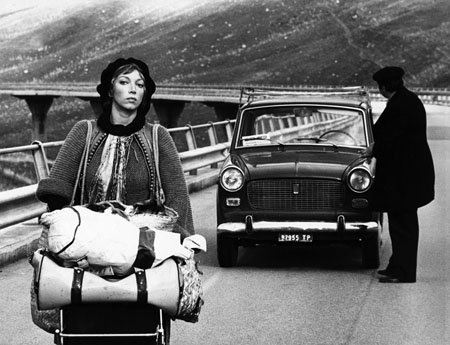On Friday, news broke that Italian actress Mariangela Melato had passed away at age 71. We know she’ll be remembered first and foremost for her performances in films by Lina Wertmüller because, with the exception of a few ill-fated attempts at a Hollywood career in the early 80s, these are the only films mentioned in reports from the BBC, the AP, the Los Angeles Times, and so on.
And we’ll get to those in a moment, but first, let’s to turn Wikipedia to note that “she began her stage career in the early 1960s and rose to fame after delivering powerful performances for a number of notable Italian stage directors such as Dario Fo, Luchino Visconti and Luca Ronconi. Her cinematic debut came in 1969 with Pupi Avati’s Thomas e gli indemoniati and Melato would continue to deliver memorable performances in the 1970s and grew to become a highly respected leading lady of many acclaimed and award-winning Italian films. Her memorable early film roles include the school teacher in Nino Manfredi’s comedy Between Miracles (1971) and the female leads in Elio Petri’s The Working Class Goes to Heaven (1971) and Vittorio De Sica‘s Lo chiameremo Andrea (We’ll Call Him Andrew, 1972).”
Now then, those Wertmüllers, which Daniel E. Slotnik sums up so well for the New York Times:
In The Seduction of Mimi (1972), Ms. Melato played Fiorella, a jilted Sicilian wife who takes revenge on her adulterous husband, [Giancarlo] Giannini’s Mimi, by cuckolding him. In Love and Anarchy (1973), Ms. Wertmüller’s anti-Fascist drama, Ms. Melato plays Salomè, a prostitute and anarchist who helps a callow farmer, Mr. Giannini’s Tunin, in his plot to assassinate Mussolini.
Probably Ms. Melato’s best-known role in a Wertmüller film was as Raffaella in Swept Away, a sometimes harrowing romantic comedy of class conflict released in Italy in 1974. Raffaella, a haughty member of the Milanese upper class, is outspoken in her contempt for Gennarino (Mr. Giannini), a Communist Sicilian deckhand aboard a yacht she has rented.
When the two become stranded on a Mediterranean island, they reverse their societal roles, with Gennarino humiliating and abusing Raffaella until she submits and falls in love with him. They quickly reassume their places in society once rescued.
Further in, he adds: “Though the film angered other critics and many feminists, it became a hit in Europe and the United States.” And of course, Guy Ritchie’s 2002 remake with Madonna and Adriano Giannini, Giancarlo’s son, was a hit nowhere.
But let’s wrap on a more positive note. In 1976, Melato took the lead in Mario Monicelli’s Caro Michele, adapted by Suso Cecchi D’Amico from Natalia Ginzburg’s novel. The story of an Italian immigrant in London won a Silver Bear for Monicelli at the Berlinale and a David di Donatello Best Actress Award for Melato.
Update, 1/15: She “was one of Italy’s most versatile and vivacious actresses,” writes John Francis Lane for the Guardian. “Born in Milan, she trained at the city’s Brera Academy. One of the first companies to sign her up was that of the playwright Dario Fo and his wife, Franca Rame, who gave her a part in Fo’s Seventh Commandment: Steal a Little Less. In 1967 Luchino Visconti cast Melato as one of the nuns in his Rome production of Giovanni Testori’s The Nun of Monza, which was closed by the censors. Melato was more fortunate when she played Olimpia in Luca Ronconi’s adaptation of Ludovico Ariosto’s Orlando Furioso at the Spoleto festival in 1969, one of the most highly acclaimed theatrical events of the period.”
Update, 1/18: Mike Hodges sends a note to the Guardian: “The film that possibly gave Mariangela Melato her biggest worldwide exposure was strangely omitted from her obituary. It is Flash Gordon (1980), in which she played the role of Kala, the Emperor Ming’s head of security. I directed it and can vouch that Mariangela and Max von Sydow, both very serious actors, revelled in portraying these outrageous villains. We had a lot of fun making that film and I think the fun that she had is up there on the screen.”
For news and tips throughout the day every day, follow @KeyframeDaily on Twitter and/or the RSS feed. Get Keyframe Daily in your inbox by signing in at fandor.com/daily.





